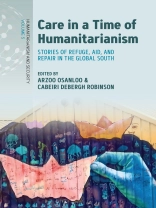The vast majority of forced migrants & refugees seek shelter and respite in countries of the Global South, where humanitarian spaces and practices of care are no exceptions to international humanitarianism but rather part of a project founded on hybrid forms of care that include local and vernacular practices. Care in a Time of Humanitarianism presents complex histories of forced migration and humanitarianism in an accessible way. It applies a comparative approach to highlight the diverse cultural and religious traditions of care that are adopted across the Global South for the “distant others”.
Table des matières
List of Illustrations
Acknowledgements
Introduction: Care in a Time of Humanitarianism: Stories of Refuge, Aid, and Repair in the Global South
Arzoo Osanloo and Cabeiri de Bergh Robinson
Part I: Refuge, Law, and Empire in the Global South
Chapter 1. Patriation: Conceptualizing Migration after Empire
Pamela Ballinger
Chapter 2. Staging Filipino Hospitality: Transitional Intimacies of Jewish Refuge in the Commonwealth Philippines
James Pangilinan
Chapter 3. Burma Evacuees: R. Sanyassiah, Post-war Return, and Displacement in Modern South Asia
Emma C. Meyer
Chapter 4. Khao-i-Dang Refugee Camp: Local Hosts and Hauntings of the Third Indochina War in a Transit Zone
Khathaleeya Liamdee
Chapter 5. A ‘Lucky Escape’: Ethnic Cleansing and What Happens When International Humanitarianism Fails
Kathie Friedman-Kasaba
Chapter 6. Benevolent Arts: The Persistence of Mercy in Humanitarian Logics
Arzoo Osanloo
Part II: Aid, Intimacy, and Humanitarian Praxis
Chapter 7. Humanitarian Departures: Reflections of a Refugee Aid Worker
Ilana Feldman
Chapter 8. Quiet Aid: Barbara Schöfnagel’s Private Humanitarianism in the Socialist Gray Area (and What Else the Global East Can Teach Us)
Cristian Capotescu
Chapter 9. Yūsuf’s Struggle: Negotiating Development and Charity in a Palestinian Refugee Camp
Gözde Burcu Ege
Chapter 10. “They are Muhajir, We are Ansar:” Godforsakenness at the Myanmar-Bangladesh Border
Tanzeen Rashed Doha
Chapter 11. “We’re All Humanitarians”: International Humanitarian Organizations, Islamist Service Societies, and the Practice of ‘Humanitariyan Jihad’ in Kashmir
Cabeiri de Bergh Robinson
Part III: Repair in a World of Care
Chapter 12. Red Coat, Denim Shirt: Conceptualizing Displacement Across Generations
Rawan Arar
Chapter 13. The Barrette: Unlikely Humanitarian Images and Practices of Repair
Jenna Grant
Chapter 14. Memoir and a Sinking Ship: Reconstituting Sovereignty through Refugee Narratives
Megan Butler
Chapter 15. The Gift of Food: An Islamic Ethics of Care
Amira Mittermaier
Chapter 16. Mothering the Dead: Care Beyond Life in Kurdistan
Mediha Sorma
Chapter 17. Unintended Consequences: Debating the Protection of Cultural Heritage During Humanitarian Crises
Stephanie Selover
Conclusion: Concluding Conversation: A Global South’s Lessons in Humanitarianism
Arzoo Osanloo & Cabeiri de Bergh Robinson
Appendix I: Pedagogical Supplement
Arzoo Osanloo & Cabeiri de Bergh Robinson
A propos de l’auteur
Cabeiri de Bergh Robinson is Associate Professor of International Studies and Anthropology at the University of Washington. She co-edited The Palgrave Handbook of New Directions in Kashmir Studies (Palgrave, 2023), and is the author of Bernard Cohn Book Prize winner Body of Witness, Body of Warrior: Refugee Families and the Making of Kashmiri Jihadists (University of California Press, 2013).












